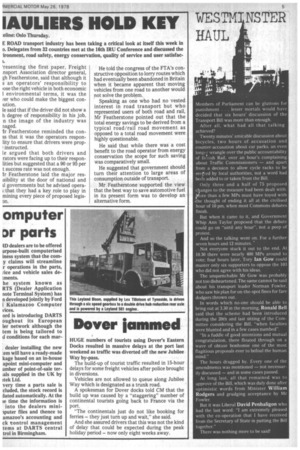WESTM NSTER HAUL
Page 7

If you've noticed an error in this article please click here to report it so we can fix it.
Members of Parliament can be gluttons for punishment . . . lesser mortals would have decided that six hours' discussion of the Transport Bill was more than enough.
After all, what had all that talking achieved?
Twenty minutes' amicable discussion about bicycles, two hours of accusation and counter-accusation about car parks, an even longl.; wrangle over the public accountability of BE iiish Rail, over an hour's complaining about Traffic Commissioners — and apart from a decision to allow cycle racks to be ereVed by local authorities, not a word had bee'n added to or taken from the Bill.
Only three and a half of 75 proposed c anges to the measure had been dealt with. tore than a few MPs must have toyed with '-the thought of ending it all at the civilised hour of 10 pm, when most Commons debates finish.
But when it came to it. and Government Whip Ann Taylor proposed that the debate could go on "until any hour", not a peep of protest.
And so the talking went on. For a further seven hours and 12 minutes. '
Not everyone stuck it out to the end. At 10.30 there were nearly 400 MPs around to vote; four hours later, Tory Ian Gow could muster only six supporters to oppose the 103 who did not agree with his ideas.
The unquenchable Mr Gow was probably not too disheartened. The same cannot be said about his transport leader Norman Fowler, who saw his plan for on-the-spot fines for fare dodgers thrown out.
In words which no-one should be able to bring out at 3.30 in the morning, Ronald Bell said that the scheme had been introduced during the 20th and last sitting of the Committee considering the Bill, "when faculties were blunted and in a few cases numbed".
"In a fuddle of good intentions and mutual congratulation, there floated through on a wave of obtuse bonhomie one of the most flagitious proposals ever to befoul the human mind."
The hours dragged by. Every one of the amendments was mentioned — not necessarily discussed — and in some cases passed.
At long last, all that remained was to approve of the Bill, which was duly done after optimistic words from Minister William Rodgers and grudging acceptance by Mr Fowler.
But it was Liberal David Penhaligon who had the last word: "I am extremely pleased with the co-operation that I have received from the Secretary of State in putting the Bill together."
There was nothing more to be said
















































































































































































































